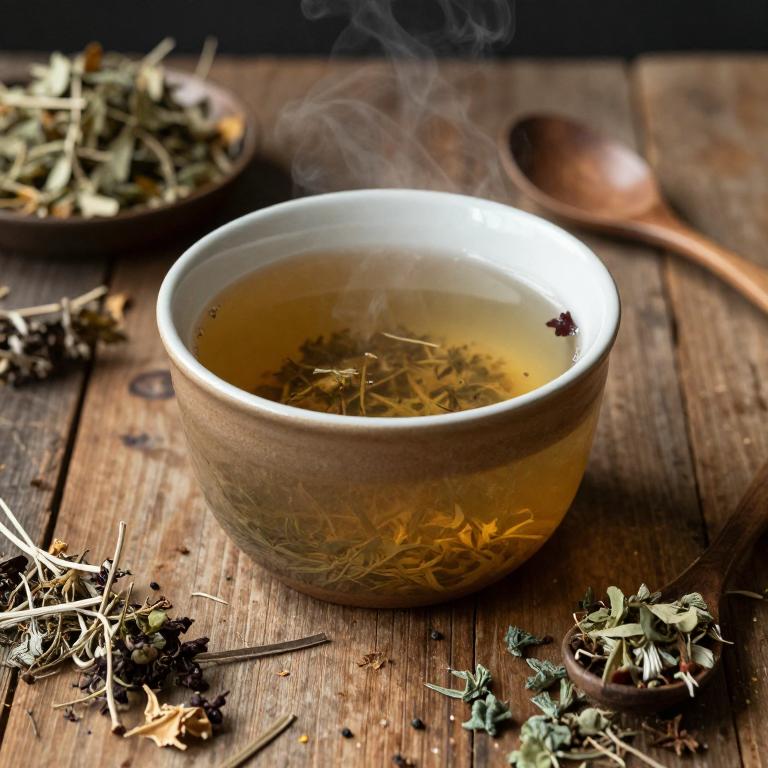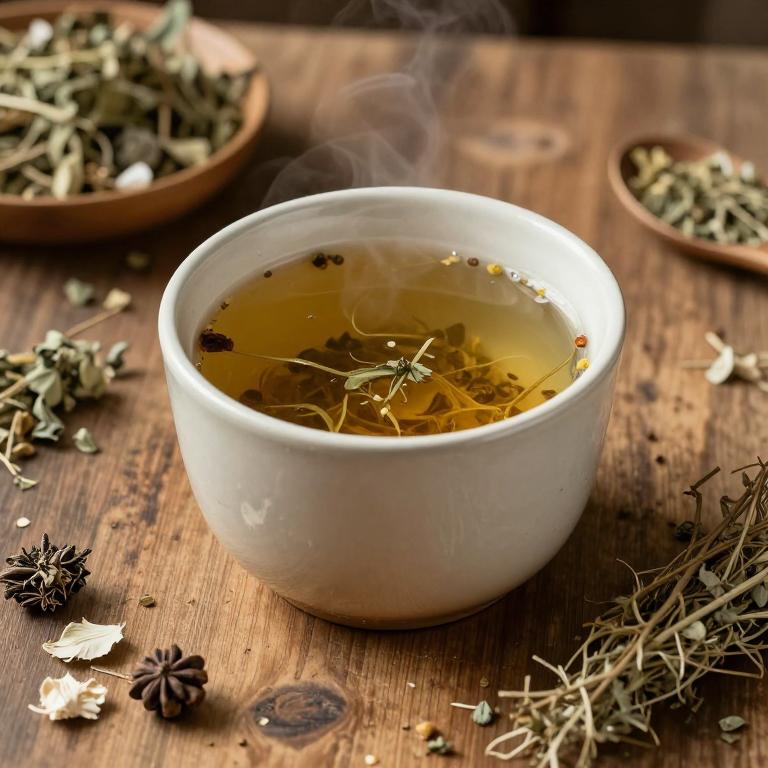10 Best Herbal Decoctions For Chest Congestion

Herbal decoctions have been traditionally used to alleviate chest congestion by promoting respiratory health and reducing inflammation.
Common herbs such as eucalyptus, ginger, and thyme are often included in these preparations due to their expectorant and antiseptic properties. To prepare a decoction, the herbs are typically simmered in water for an extended period to extract their active compounds. This method allows for the gradual release of beneficial compounds that can help loosen mucus and ease breathing.
While herbal decoctions can be effective for mild cases of chest congestion, it is advisable to consult a healthcare professional for persistent or severe symptoms.
Table of Contents
- 1. Eucalyptus (Eucalyptus globulus)
- 2. Peppermint (Mentha piperita)
- 3. Thyme (Thymus vulgaris)
- 4. Ginger (Zingiber officinale)
- 5. Fennel (Foeniculum vulgare)
- 6. Licorice (Glycyrrhiza glabra)
- 7. Ceylon cinnamon (Cinnamomum verum)
- 8. Rosemary (Rosmarinus officinalis)
- 9. Scots pine (Pinus sylvestris)
- 10. Salvia (Salvia officinalis)
1. Eucalyptus (Eucalyptus globulus)

Eucalyptus globulus, commonly known as the Australian blue gum, is widely used in herbal medicine for its expectorant and decongestant properties.
Its essential oil, rich in compounds like eucalyptol, helps to loosen mucus and reduce inflammation in the respiratory tract, making it beneficial for relieving chest congestion. Herbal decoctions made from the leaves of eucalyptus globulus are often prepared by simmering the dried leaves in water to extract their therapeutic compounds. These decoctions are traditionally used to support respiratory health and can be consumed as a warm tea to ease breathing and soothe irritated airways.
However, it is important to consult a healthcare professional before using eucalyptus-based remedies, especially for individuals with asthma or other respiratory conditions.
2. Peppermint (Mentha piperita)

Mentha piperita, commonly known as peppermint, is often used in herbal decoctions to alleviate symptoms of chest congestion due to its expectorant and decongestant properties.
When prepared as a herbal decoction, peppermint leaves are simmered in water to release essential oils and active compounds like menthol, which help to loosen mucus and soothe irritated airways. This natural remedy is particularly effective for dry or productive coughs associated with respiratory conditions such as bronchitis or the common cold. The cooling effect of menthol can also provide a refreshing sensation that helps ease breathing and reduce throat irritation.
However, it is important to consult with a healthcare professional before using peppermint decoctions, especially for individuals with asthma, gastrointestinal issues, or those taking certain medications.
3. Thyme (Thymus vulgaris)

Thymus vulgaris, commonly known as thyme, has been traditionally used in herbal medicine for its expectorant and antimicrobial properties, making it a popular choice for alleviating chest congestion.
When prepared as a herbal decoction, thyme is typically simmered with water to extract its essential oils and volatile compounds, which contribute to its therapeutic effects. The active components, such as thymol and carvacrol, help to loosen mucus and reduce inflammation in the respiratory tract, providing relief from persistent coughs and congestion. This decoction can be consumed as a warm tea or added to steam inhalation treatments for enhanced respiratory comfort.
While generally safe, it is advisable to consult a healthcare professional before using thyme decoctions, especially for individuals with allergies or existing medical conditions.
4. Ginger (Zingiber officinale)

Zingiber officinale, commonly known as ginger, has been traditionally used in herbal medicine to alleviate chest congestion due to its expectorant and anti-inflammatory properties.
When prepared as a decoction, ginger helps to loosen mucus in the respiratory tract, making it easier to expel and providing relief from coughing and shortness of breath. The active compounds in ginger, such as gingerol and shogaol, contribute to its ability to reduce inflammation and soothe irritated airways. To prepare a ginger decoction, fresh ginger root is sliced and simmered in water for several minutes, then strained and consumed warm.
This natural remedy is often used as a complementary therapy alongside conventional treatments for chest congestion caused by colds, bronchitis, or other respiratory conditions.
5. Fennel (Foeniculum vulgare)

Foeniculum vulgare, commonly known as fennel, has been traditionally used in herbal medicine to alleviate chest congestion due to its expectorant and anti-inflammatory properties.
A fennel herbal decoction is typically prepared by simmering the dried seeds in water for several minutes, allowing the active compounds such as anethole and fenchone to be extracted. This decoction helps to loosen mucus in the respiratory tract, making it easier to expel and providing relief from coughing and discomfort. It is often recommended for use in cases of bronchitis, colds, or other respiratory infections where mucus buildup is a concern.
However, individuals with allergies to related plants or those taking certain medications should consult a healthcare provider before using fennel decoctions.
6. Licorice (Glycyrrhiza glabra)

Glycyrrhiza glabra, commonly known as licorice root, has been traditionally used in herbal medicine for its expectorant and anti-inflammatory properties.
When prepared as a decoction, it helps to loosen mucus and reduce inflammation in the respiratory tract, making it beneficial for alleviating chest congestion. The active compounds in licorice root, such as glycyrrhizin and flavonoids, contribute to its ability to soothe irritated airways and enhance the effectiveness of other respiratory remedies. However, prolonged use of licorice root decoctions may lead to side effects like hypertension due to its effect on the body's mineral balance.
As a result, it is often recommended to use licorice root under the guidance of a qualified herbalist or healthcare provider, especially for individuals with pre-existing health conditions.
7. Ceylon cinnamon (Cinnamomum verum)

Cinnamomum verum, commonly known as true cinnamon, has been traditionally used in herbal medicine to alleviate symptoms of chest congestion.
When prepared as a decoction, the bark of the cinnamon tree is simmered in water to release its essential oils and bioactive compounds, such as cinnamaldehyde and eugenol. These compounds possess antimicrobial and anti-inflammatory properties that may help reduce mucus production and soothe irritated airways. The warm, aromatic steam from the decoction can also provide relief by loosening bronchial secretions and improving respiratory comfort.
However, it is important to consult a healthcare professional before using cinnamon decoctions, especially for prolonged periods or in individuals with known allergies or chronic respiratory conditions.
8. Rosemary (Rosmarinus officinalis)

Rosmarinus officinalis, commonly known as rosemary, has been traditionally used in herbal medicine to alleviate chest congestion due to its expectorant and anti-inflammatory properties.
When prepared as a decoction, rosemary helps loosen mucus in the respiratory tract, making it easier to expel and providing relief from coughing and discomfort. The essential oils in rosemary, such as cineole and camphor, contribute to its bronchodilatory effects, which can help ease breathing in individuals with chest congestion. To prepare the decoction, fresh or dried rosemary leaves are simmered in water for several minutes, and the resulting infusion can be consumed warm.
While generally considered safe, it is advisable to consult a healthcare professional before using rosemary decoctions, especially for prolonged periods or in individuals with certain health conditions.
9. Scots pine (Pinus sylvestris)

Pinus sylvestris, commonly known as Scots pine, has been traditionally used in herbal medicine for its potential respiratory benefits, particularly in alleviating chest congestion.
The bark and needles of the tree contain compounds such as terpenoids and flavonoids, which may help reduce inflammation and loosen mucus in the airways. A herbal decoction made from dried Scots pine needles can be prepared by simmering them in water for several minutes, allowing the active ingredients to infuse into the liquid. This decoction is often consumed as a tea to support breathing and ease discomfort associated with chest congestion.
While it is generally considered safe, it is advisable to consult a healthcare professional before using it, especially for individuals with pre-existing medical conditions or those taking medications.
10. Salvia (Salvia officinalis)

Salvia officinalis, commonly known as sage, has been traditionally used in herbal medicine to address chest congestion due to its expectorant and antispasmodic properties.
When prepared as a decoction, sage leaves are boiled in water to release compounds such as flavonoids and phenolic acids, which may help loosen mucus and reduce inflammation in the respiratory tract. This herbal remedy is often recommended for individuals suffering from bronchitis or persistent coughs associated with chest congestion. However, it is important to use sage decoctions in moderation, as excessive consumption may lead to side effects such as gastrointestinal discomfort.
As with any herbal treatment, it is advisable to consult a healthcare professional before use, especially for those with underlying health conditions or taking other medications.